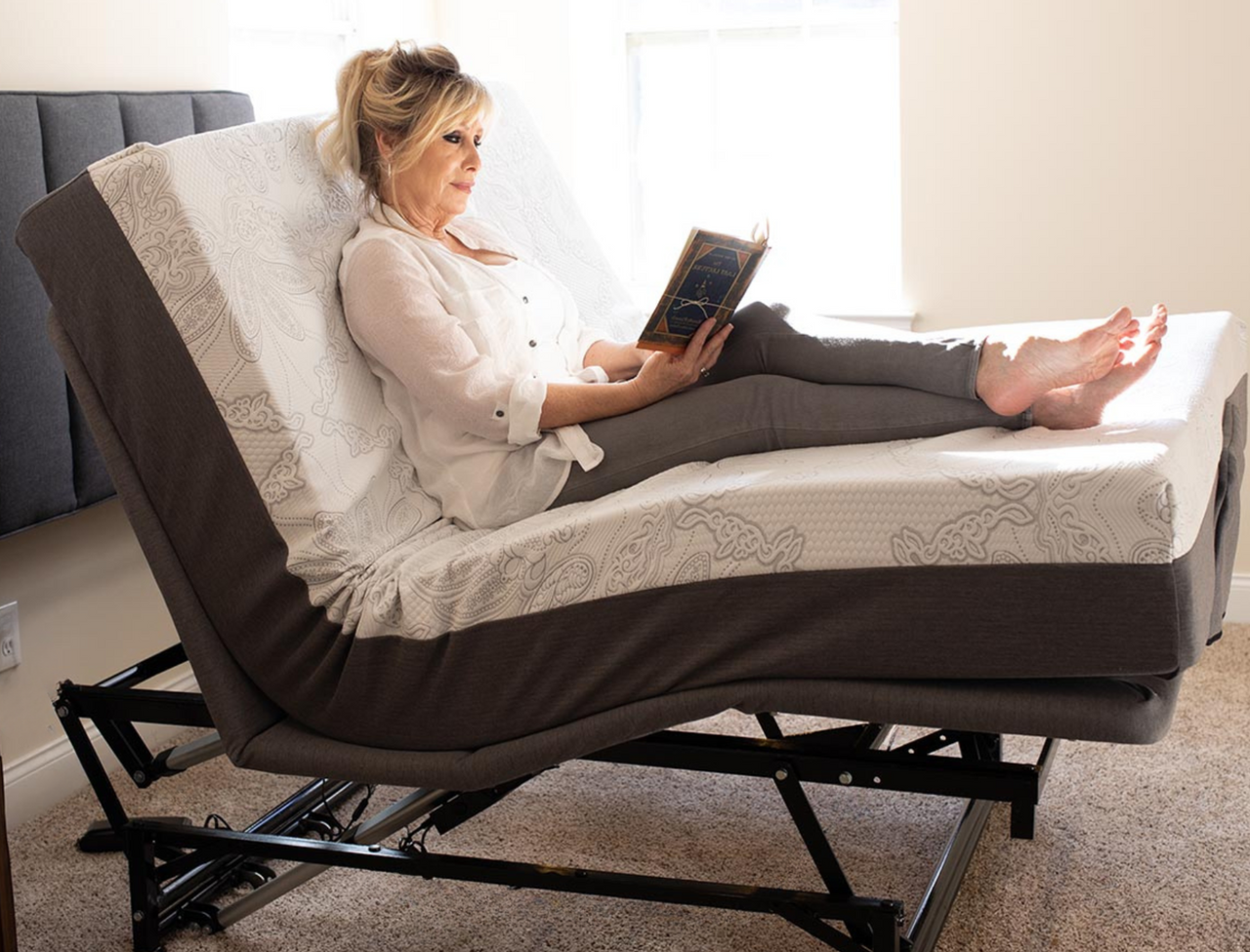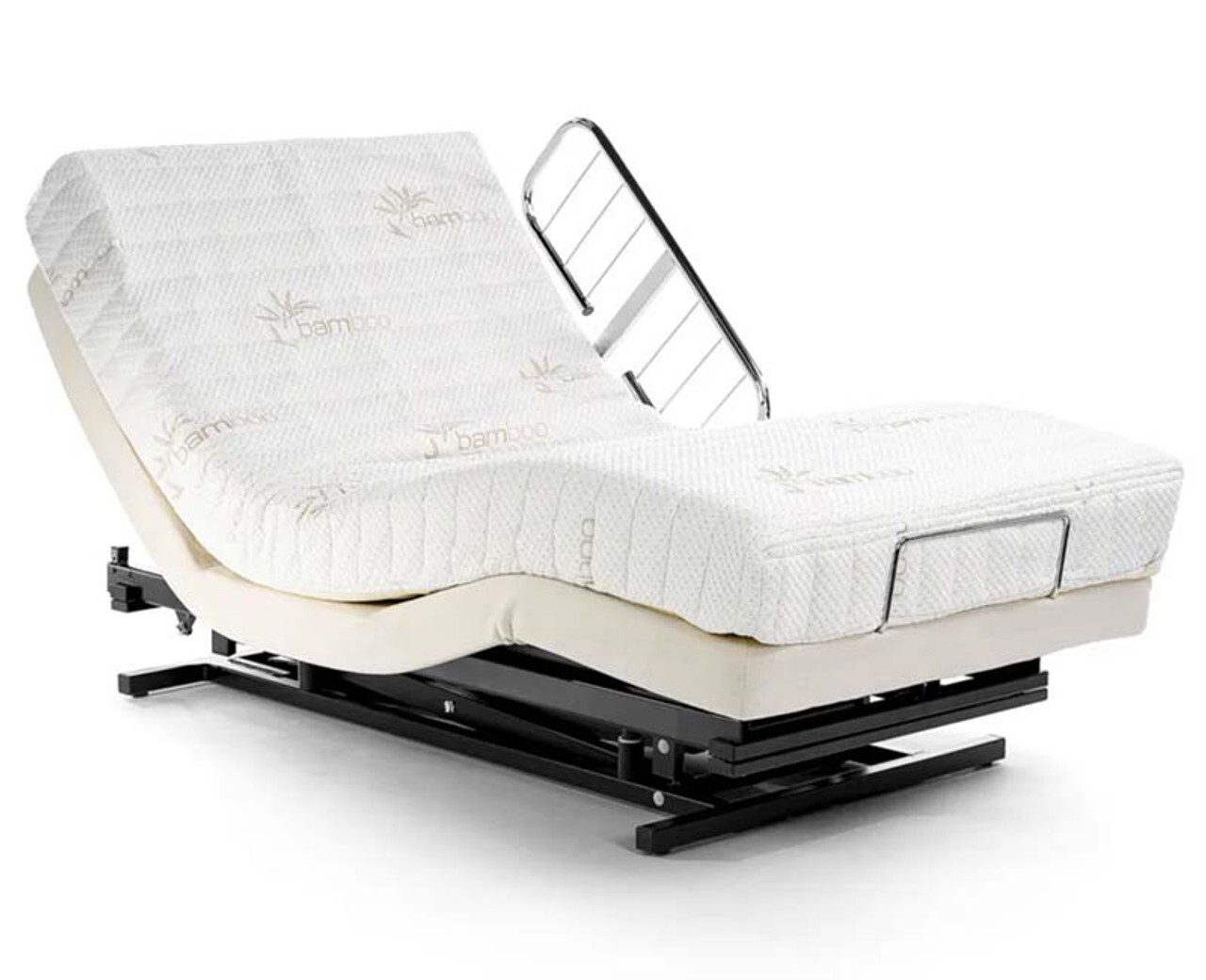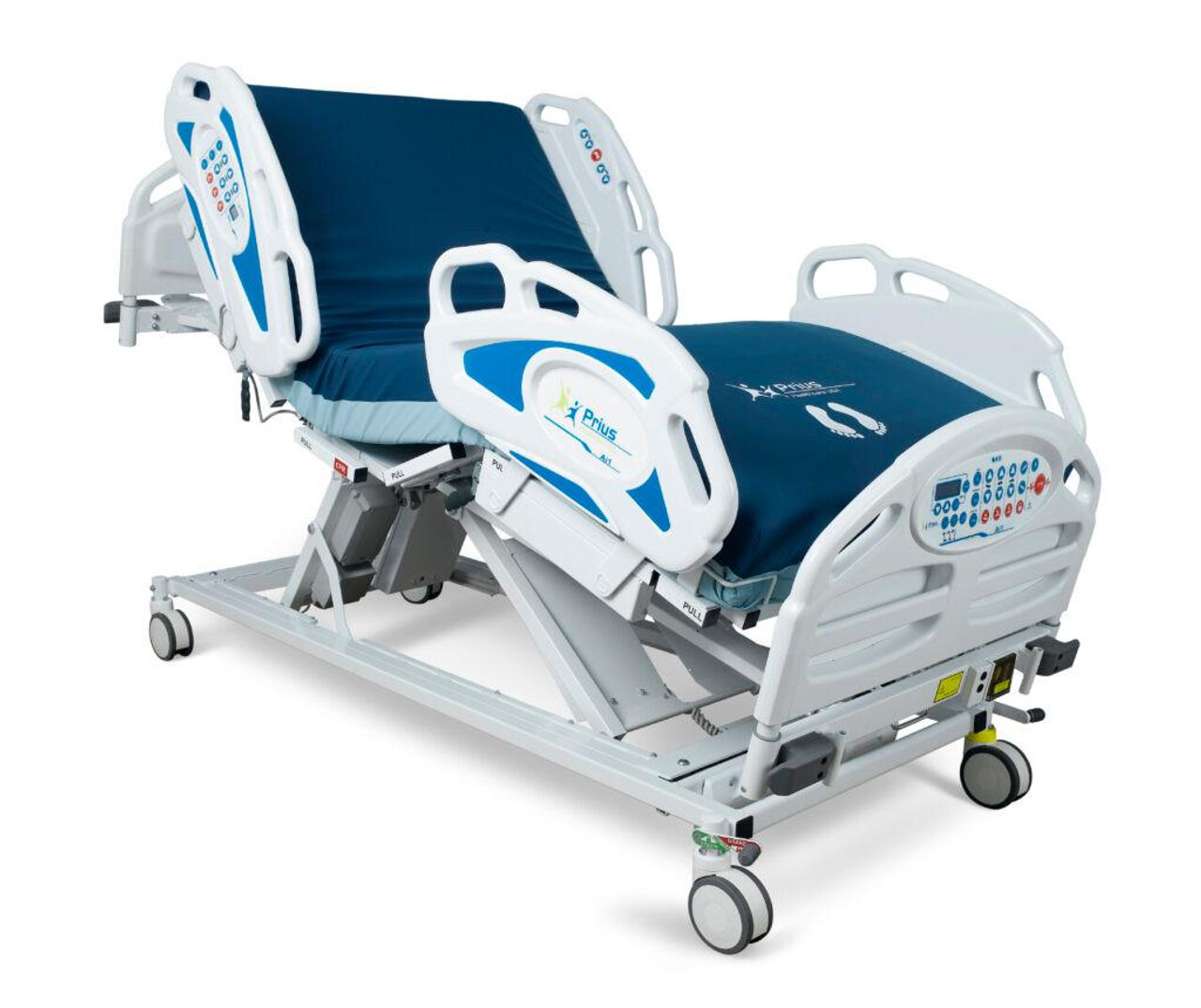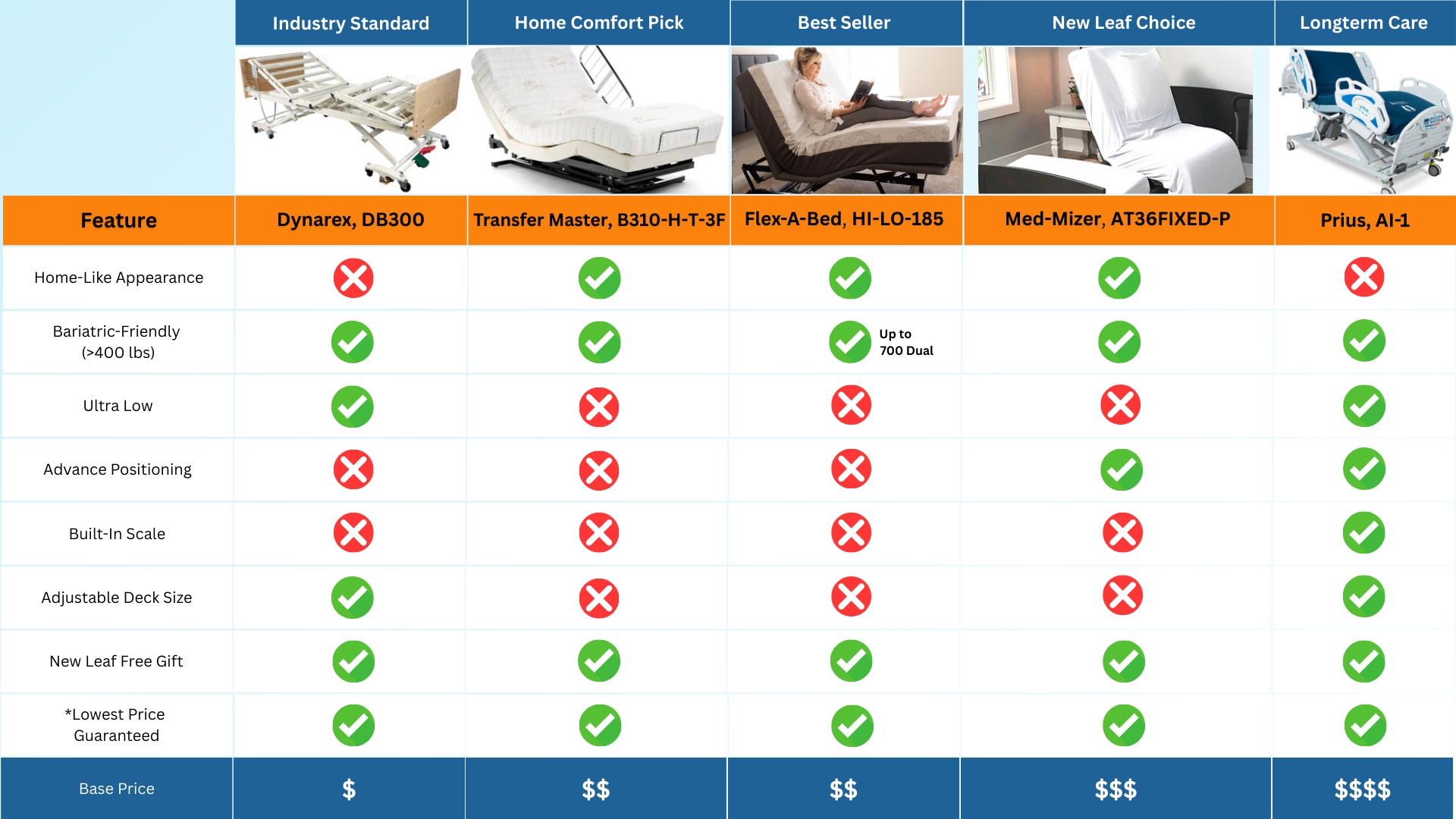FREE SHIPPING ON ORDERS OVER $75
Hospital Bed Mattresses for Home Use - Best for Health

A hospital bed mattress can make a significant difference in a patient’s comfort, support, and overall well-being. Designed to meet the unique needs of individuals requiring long-term or specialized care, these mattresses go beyond standard options by offering features that relieve pressure, aid in recovery, and support various health requirements. Choosing the right mattress involves balancing factors like comfort, durability, and health benefits to ensure the best possible experience.
For patients who spend extended periods in bed, the right mattress can prevent discomfort, reduce the risk of bedsores, and promote proper circulation. Let’s explore the types of hospital bed mattresses available, the health and comfort benefits of each, and tips for choosing the best option for home care.
Mattress Types for Hospital Beds
Innerspring Mattresses
Innerspring mattresses use coils to provide support and are one of the more affordable options for hospital beds. These mattresses offer a traditional, firm support level, which may be comfortable for individuals who do not need frequent repositioning or who have minimal mobility issues.
However, innerspring mattresses may not provide adequate pressure relief for patients at risk of bedsores, as the coils can create pressure points. They may be better suited for short-term care or for patients with low to moderate care needs who do not require specialized support.
Foam Mattresses
Foam mattresses are popular for their supportive and pressure-relieving qualities. Typically made from memory foam or high-density foam, these mattresses contour to the body, helping to distribute weight evenly. This reduces pressure on specific areas, such as the hips, shoulders, and lower back, which is essential for patients at risk of developing pressure sores.
 Memory foam mattresses are also known for their durability and ability to maintain shape over time. Many foam mattresses offer varying levels of firmness to suit individual comfort preferences, making them a versatile choice for long-term care.
Memory foam mattresses are also known for their durability and ability to maintain shape over time. Many foam mattresses offer varying levels of firmness to suit individual comfort preferences, making them a versatile choice for long-term care.
Air Mattresses
Air mattresses for hospital beds use adjustable air chambers that allow for customizable firmness levels. These mattresses are ideal for patients who need frequent repositioning, as the air pressure can be adjusted to prevent prolonged pressure on any one area. Many air mattresses also feature alternating pressure settings, which help reduce the risk of bedsores by changing the pressure points regularly.
While air mattresses provide excellent pressure relief, they require a power source and periodic maintenance to ensure optimal performance. They are particularly beneficial for patients with limited mobility who spend extended time in bed, as they offer both comfort and essential pressure relief.
Gel Mattresses
Gel mattresses use a gel layer to provide cooling comfort, helping to regulate body temperature for individuals who may become overheated in bed. These mattresses often combine gel with foam layers to provide both comfort and support, making them a good option for those who experience discomfort from heat while sleeping.
Gel mattresses also offer moderate pressure relief,  making them suitable for patients who require a balance of comfort and support. However, they may not offer the same level of pressure management as foam or air mattresses, so they may be best for those with low to moderate care needs.
making them suitable for patients who require a balance of comfort and support. However, they may not offer the same level of pressure management as foam or air mattresses, so they may be best for those with low to moderate care needs.
Choosing Based on Comfort and Health
Pressure Relief for Bedsores
 For patients who spend extended time in bed, pressure relief is a top priority. Mattresses like memory foam or air mattresses are designed to reduce pressure points, which is essential in preventing bedsores. Foam mattresses contour to the body, providing even support, while air mattresses offer adjustable firmness levels that can alternate to relieve prolonged pressure.
For patients who spend extended time in bed, pressure relief is a top priority. Mattresses like memory foam or air mattresses are designed to reduce pressure points, which is essential in preventing bedsores. Foam mattresses contour to the body, providing even support, while air mattresses offer adjustable firmness levels that can alternate to relieve prolonged pressure.
Selecting a mattress that prioritizes pressure relief  can make a significant difference in a patient’s health, especially for those with limited mobility. It’s important to choose a mattress that aligns with the patient’s specific risk level for bedsores.
can make a significant difference in a patient’s health, especially for those with limited mobility. It’s important to choose a mattress that aligns with the patient’s specific risk level for bedsores.
Temperature Regulation for Comfort
Temperature regulation is another key consideration, particularly for patients who may experience discomfort due to overheating. Gel mattresses are an excellent choice for those sensitive to heat, as they help maintain a cooler surface. Foam mattresses with built-in cooling layers can also be effective in managing temperature, keeping patients comfortable throughout the night.
Choosing a mattress with temperature control features helps prevent discomfort and allows patients to rest peacefully, which is critical for overall health and recovery.
Infection Control and Maintenance
Infection control is an essential aspect of hospital bed care. Many hospital bed mattresses come with antimicrobial covers that protect against bacteria and other pathogens. These covers are typically waterproof and easy to clean, which simplifies maintenance and reduces the risk of infection for patients with compromised immune systems.
Selecting a mattress with a removable, washable cover or one made from antimicrobial materials can enhance cleanliness and hygiene, which is particularly important for patients with extended or long-term care needs.
Memory Foam vs. Air Mattresses
Memory Foam Mattresses: Benefits and Considerations
Memory foam mattresses are popular for their contouring support and pressure-relieving qualities. They provide a stable and even surface, distributing weight to minimize pressure points. This can be particularly beneficial for individuals who need consistent support to prevent discomfort or bedsores.
However, memory foam mattresses can retain heat, which may be uncomfortable for patients prone to overheating. Some memory foam mattresses incorporate cooling layers or gel-infused foam to offset this issue, making them suitable for a broader range of patients.
Air Mattresses: Benefits and Considerations
Air mattresses are highly adjustable, allowing caregivers or patients to modify the firmness according to comfort and health needs. Many air mattresses feature alternating pressure systems that relieve constant pressure on specific body parts, reducing the risk of bedsores. This makes them ideal for patients who are immobile or need regular repositioning.
The primary considerations for air mattresses include maintenance and the need for a continuous power source. These mattresses may require repairs or adjustments over time, and power outages can impact functionality. Despite these considerations, air mattresses remain an excellent choice for advanced pressure relief.
Best Mattress Recommendations
Top Picks for Pressure Relief
For patients at risk of bedsores or who require advanced support, an air mattress with alternating pressure settings is highly recommended. These mattresses, like the Drive Medical Med-Aire Alternating Pressure Mattress, are designed to relieve and redistribute pressure, making them ideal for those with high care needs.
an air mattress with alternating pressure settings is highly recommended. These mattresses, like the Drive Medical Med-Aire Alternating Pressure Mattress, are designed to relieve and redistribute pressure, making them ideal for those with high care needs.
Ideal Choices for Temperature Regulation
Patients sensitive to heat may benefit from a gel mattress or a memory foam mattress with cooling layers. The Tempur-Pedic Tempur-Breeze is a popular option, offering temperature regulation and comfort for patients who need both support and cooling.
Durable, Budget-Friendly Options
For those on a budget or with moderate care needs, a high-density foam mattress can offer reliable support without the cost of more advanced options. The Invacare Softform Premier mattress is a durable, affordable option, providing comfort and pressure relief suitable for many care settings.

Final Thoughts
Choosing the right mattress for a hospital bed at home is essential for creating a comfortable and supportive care environment. From foam and air to gel and innerspring options, each type of mattress brings unique benefits tailored to different health and comfort needs. By carefully considering factors such as pressure relief, temperature regulation, and ease of maintenance, caregivers can select a mattress that enhances the quality of life for patients receiving care at home.
Ultimately, the right mattress not only supports physical health but also fosters peace of mind, allowing patients to rest comfortably and caregivers to feel confident in providing quality care. With the appropriate mattress, a hospital bed becomes more than just a place to sleep—it becomes a vital part of recovery, comfort, and daily well-being.
